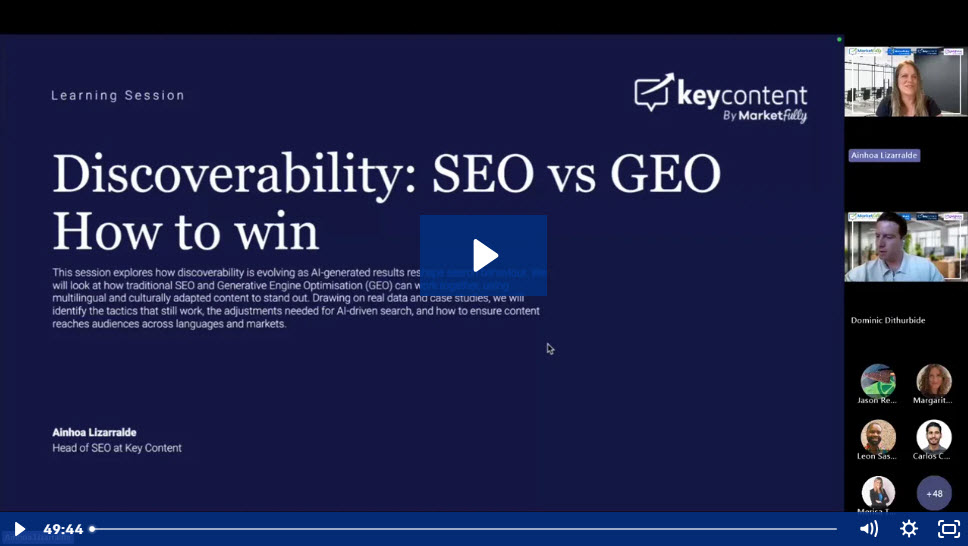Why credible travel writers make travel content better
Travel research is incredibly competitive, and doesn’t follow a specific model, with travellers skimming dozens of high-quality sites to plan their trips effectively. If your page isn’t credible, you’re not going to win the race. According to Google’s Search Quality Evaluator Guidelines, experience, expertise, authoritativeness, and trustworthiness (E-E-A-T) are the key signals of helpful, “people-first” content.
The most convincing, and therefore credible, travel content should feel like it’s been written by someone who’s been there. According to Nielsen Norman Group, web users value comprehensive, current content and links to credible sources more than anything else. You get these factors through expert writers who cite official tourism sites or personal experiences, which will make your pages feel legitimate and engaging.
The stakes are particularly high in travel content, with some studies showing that travel websites often see bounce rates around 50%, which means half of all visitors are leaving after the first page view. If your content is generic or shallow, you’ll lose readers quickly.
Travel content written by a writer who’s been there offers real-world knowledge of destinations, seasons, itineraries, etc., which adds a ton of credibility to your content. Basically, high-authority travel content will meet the users’ needs for trustworthy answers and will convert those clicks by engaging your readers.
Data-driven proof for experts vs. SEO-only content
We conducted our own testing to confirm whether there was a benefit to expertise or not. In a controlled case study, Key Content produced two sets of pages on similar topics. The first set of pages was written by travel specialists with deep knowledge of the subject, while the second set was written by standard, SEO-focused writers.
The results? Rather enlightening. The pages that were written by experts earned, on average, a 1.5X higher page authority, 10X more organic search traffic, and 2.2X more backlinks than their SEO-only counterparts.
This dramatic lift in numbers highlights a simple truth for us, and for you, that expertise will attract attention. Readers naturally link to and share content that offers unique insights or first-hand tips, which helps boost your page authority and traffic. In the Key Content study, the extra links gained by expert-written pages boosted authority directly, showing that careful talent selection is as important as technical SEO.
Let’s look at The Points Guy (TPG) as another real-world example, which started out as one expert, Brian Kelly, writing deep, practical content for an airline loyalty programme, and has since grown to employ close to 100 people in the USA and the UK. Over time, the expert-led content became the product, rather than the content being produced. According to Digiday, the business grew directly out of expert content and affiliate monetisation, and TPG’s own profile highlights that expert-authored content is responsible for the drive in traffic and revenue.

Why having credible writers matters for travel
We’ll start at the search engine source, Google. If you pay attention to the latest guidance on content quality, there’s some unique insights into expertise, credibility, and how they work together to give you high-performing content. The Helpful Content Update and E-E-A-T framework tell us that content should be written for humans first, rather than for search algorithms. One thing Google specifically notes is that helpful content usually shows first-hand expertise and a deep knowledge of the topic from having used a product or service, or visiting a place, which essentially gives a green light for travel brands to hire writers with lived experience.
For travel marketers, this means subject-matter expertise is an optimisation strategy itself. According to Google’s quality rater guidelines, page creators should ask themselves these questions when planning content:
- “Is this content written or reviewed by an expert or enthusiast who demonstrably knows the topic well?”
- “Does the content provide insightful analysis or interesting information that is beyond the obvious?”.
If you have an expert writer, these boxes are automatically checked because they share original perspectives and details that generic content won’t be able to share. Content that clearly comes from someone who’s dealt with these issues in real life is usually rated more helpful by users and by Google.
What makes a high-authority travel writer?
Just because someone is able to write, doesn’t mean they’ll be able to produce high-authority, trust-building content. Which is why brands need to look for signals of expertise on a writer’s profile, including things like:
- Published credentials and bylines: Look for signals that a writer has experience with travel, through author pages and social profiles. Check if they have published works. See if they’ve been featured on any other travel websites. Writers with a strong, consistent track record are more trustworthy.
- Knowledge-graph presence: Some writers have Google knowledge panels or Wikipedia pages. These public profiles reinforce the writer’s notability.
- Niche or local expertise: A writer who has lived in a region for a few years will cover local topics much easier than someone with little to no experience. Focus on finding local writers.
Aside from credentials, travel writers show that their content is high-authority, quality content by how they write. Nielsen Norman’s research suggests that users judge credibility by the writing style and sourcing of the content. Good travel content is structured well, tells a story well, avoids “marketese” and prefers concise, objective language that’s easily scannable, and, most importantly, it tells the truth.
When you have an expert writer, you hit these points naturally, because the content is based on experience. They’ll also give you clear headings, bullet points, and checklists alongside well-written, truthful content. An expert will cite reputable sources and link to them, which, according to Nielsen Norman, these outbound links to other authoritative sites shows readers that the author has “done their homework”.
How expert writers boost engagement and conversation
When your travel content is written by an expert, it resonates with real travellers, rather than just impressing an algorithm. When you offer readers depth and clarity, you take away their confusion and keep them on the site longer. When you write mediocre copy, your visitors tend to click back to search results or rival sites, looking for credible information. So, you can be the first result on the page, but if your content doesn’t inspire confidence, you won’t keep your audience.
Think with Google tells us that modern travel research is incredibly non-linear, with travellers moving back and forth between inspiration, planning, and booking stages. An expert writer can anticipate this “messy middle” by addressing questions at every step that will lower the bounce rate, like safety, visas, seasons, and cost estimates.
Having a higher engagement on your site will also translate to higher conversions. When users trust content, they’re more likely to click through to booking engines or affiliate links. Social proof is another area that plays a role, with an MDPI tourism study suggesting that when travellers see content and creators as trustworthy, they’re more inclined to visit the page with the intent to buy something.
How we hire and brief expert travel writers.
To take advantage of these benefits, travel content leaders need to follow a practical approach to sourcing and briefing writers:
- Identify the right experts: Start by shortlisting writers with strong author pages or portfolios. Look for consistent bylines in your travel niche, visible social proof, or a knowledge panel.
- Verify expertise claims: Once you have candidates, verify their claimed expertise. Have they truly travelled extensively in the region or niche, etc.?
- Improve author signals: Once hired, strengthen the writer’s authority on your site by publishing full author bios and linking to their external profiles or publications. For guidance on this, see Key Content’s insights on author authority.
- Credible sourcing emphasis: In content briefs and style guides, instruct writers to cite official data and reputable sources. Whether it’s an official tourism board or a well-known travel guide, outbound links and footnotes should be included whenever facts or stats are given.
- Create intentional briefs: Frame each assignment around traveller personas and intent rather than keywords. Google’s insights ask if your audience has learned enough about a topic to help achieve their goal. Make sure your content has a purpose and accomplishes it.
- First-hand details: Encourage writers to include specific, actionable details based on experience.
- Measure what matters: Finally, track engagement metrics to confirm your success. Compare key pages’ bounce rates, use A/B tests when possible, align content with conversion paths, and analyse constantly.
How Key Content scales high-authority content
At Key Content, we specialise in blending authoritative editorial consistency with SEO and GEO for travel brands, and we can match writers to any region or theme because our global network includes destination experts and vetted journalists from around the world.
We pair each project with strong quality assurance that involves editors checking for factual accuracy, tone, and adherence to style, while SEO specialists make sure best practices are in place without diluting the content’s voice. You can find more information on the role of content in multilingual SEO or check out our detailed guide on how to plan and strategise a multilingual content marketing strategy.
Our case study with expert-written content is just one example of the outcomes we deliver. We routinely conduct controlled content experiments for clients, A/B testing expert versus generic content, and we see consistent lifts in authority and engagement. For global brands, we also handle multilingual production and localisation, and, as part of scaling, we track every piece by engagement KPIs like dwell time, social shares, and assisted conversions from content to bookings.
We help travel brands implement the exact framework outlined above and operate large-scale content programs without losing the personal touch.
Key Takeaways for Travel Content Leaders
- Stand out with authority: Generic travel guides saturate the web, and to beat the 50% bounce baseline, you must invest in writers who bring unique insights and genuine expertise. High-authority content will consistently deliver more traffic, links, and conversions.
- Show expertise: Publish verifiable author bios and link to credible sources. Feature writers’ credentials, firsthand experience, and thorough analysis.
- Focus on engagement, not just SEO: You must write for user intent at every stage of the travel journey. Address potential questions users might have and give them detailed answers that’ll help. Track the engagement metrics against industry benchmarks and aim to do better.
- Create briefs for authenticity: Use real-life data and experience to create content briefs that’ll cover real travel concerns rather than focus on keywords. Writers must include first-hand details like transport schedules, local safety advice, or itinerary tips. This content will be seen as more “helpful” by both users and Google.
- Scale with specialist partners: Consider partnering with agencies (like Key Content) that have travel-focused editorial talent and processes. They can match you with niche experts and enforce the credibility framework at scale. As our case study shows, a controlled shift to expert authorship can yield measurable SEO and performance gains.
By focusing on expertise and creating trust in your content strategy, you’ll meet travellers’ needs for reliable guidance and improve every stage of their journey, which will gain you even more credibility. With the amount of mediocre content out there today, content authority is quickly mattering more and more.
Ready to test travel content that’s expert driven?
If you’re looking for ways to scale your travel content, we could propose a shortlist of high-authority travel writers from our talent pool matched to your destination and audience, and design a four-week pilot plan for you with clear KPIs across engagement, authority, and conversions.





